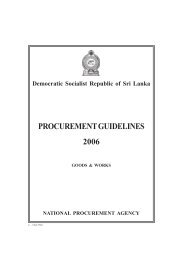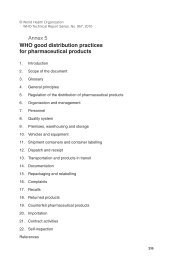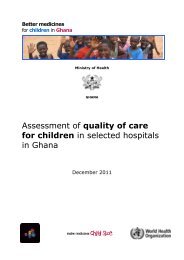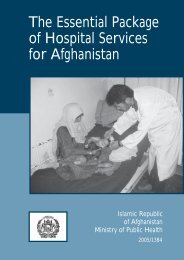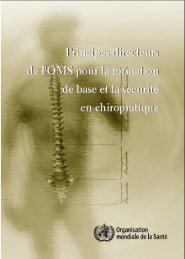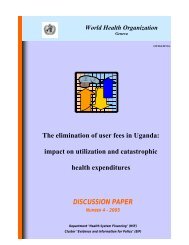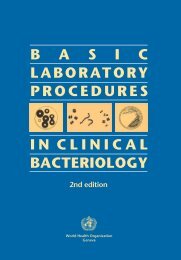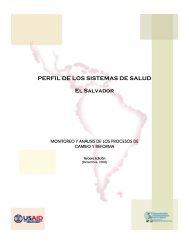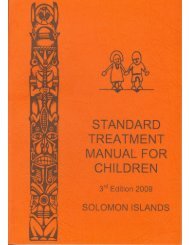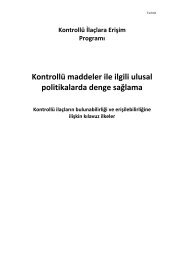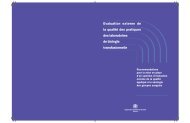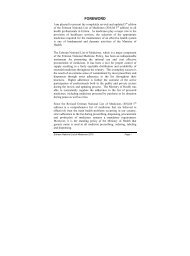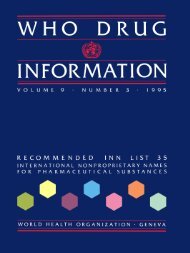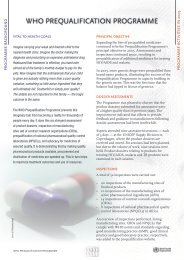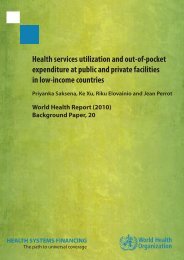- Page 1 and 2:
M A N U A LO F B A S I CTECHNIQUESF
- Page 3 and 4:
ContentsiManualofbasic techniques f
- Page 5 and 6:
ContentsiiiContentsPrefacex1. Intro
- Page 8 and 9:
viManual of basic techniques for a
- Page 10 and 11:
viiiManual of basic techniques for
- Page 12 and 13:
xManual of basic techniques for a h
- Page 14 and 15:
2 Manual of basic techniques for a
- Page 16 and 17:
4 Manual of basic techniques for a
- Page 18 and 19:
6 Manual of basic techniques for a
- Page 20 and 21:
8 Manual of basic techniques for a
- Page 22 and 23:
10 Manual of basic techniques for a
- Page 24 and 25:
12 Manual of basic techniques for a
- Page 26 and 27:
14 Manual of basic techniques for a
- Page 28 and 29:
16 Manual of basic techniques for a
- Page 30 and 31:
18 Manual of basic techniques for a
- Page 32 and 33:
20 Manual of basic techniques for a
- Page 34 and 35:
22 Manual of basic techniques for a
- Page 36 and 37:
24 Manual of basic techniques for a
- Page 38 and 39:
26 Manual of basic techniques for a
- Page 40 and 41:
28 Manual of basic techniques for a
- Page 42 and 43:
30 Manual of basic techniques for a
- Page 44 and 45:
32 Manual of basic techniques for a
- Page 46 and 47:
34 Manual of basic techniques for a
- Page 48 and 49:
36 Manual of basic techniques for a
- Page 50 and 51:
38 Manual of basic techniques for a
- Page 52 and 53:
40 Manual of basic techniques for a
- Page 54 and 55:
42 Manual of basic techniques for a
- Page 56 and 57:
44 Manual of basic techniques for a
- Page 58 and 59:
46 Manual of basic techniques for a
- Page 60 and 61:
48 Manual of basic techniques for a
- Page 62 and 63:
50 Manual of basic techniques for a
- Page 64 and 65:
52 Manual of basic techniques for a
- Page 66 and 67: 54 Manual of basic techniques for a
- Page 68 and 69: 56 Manual of basic techniques for a
- Page 70 and 71: 58 Manual of basic techniques for a
- Page 72 and 73: 60 Manual of basic techniques for a
- Page 74 and 75: 62 Manual of basic techniques for a
- Page 76 and 77: 64 Manual of basic techniques for a
- Page 78 and 79: 66 Manual of basic techniques for a
- Page 80 and 81: 68 Manual of basic techniques for a
- Page 82 and 83: 70 Manual of basic techniques for a
- Page 84 and 85: 72 Manual of basic techniques for a
- Page 86 and 87: 74 Manual of basic techniques for a
- Page 88 and 89: 76 Manual of basic techniques for a
- Page 90 and 91: 78 Manual of basic techniques for a
- Page 92 and 93: 80 Manual of basic techniques for a
- Page 94 and 95: 82 Manual of basic techniques for a
- Page 96 and 97: 84 Manual of basic techniques for a
- Page 98 and 99: 86 Manual of basic techniques for a
- Page 100 and 101: 88 Manual of basic techniques for a
- Page 102 and 103: 90 Manual of basic techniques for a
- Page 104 and 105: Table 3.2 Dispatch of specimens 92
- Page 106 and 107: 94 Manual of basic techniques for a
- Page 108 and 109: 96 Manual of basic techniques for a
- Page 110 and 111: 98 Manual of basic techniques for a
- Page 112 and 113: 100 Manual of basic techniques for
- Page 114 and 115: 102 Manual of basic techniques for
- Page 118 and 119: 106 Manual of basic techniques for
- Page 120 and 121: 108 Manual of basic techniques for
- Page 122 and 123: 110 Manual of basic techniques for
- Page 124 and 125: 112 Manual of basic techniques for
- Page 126 and 127: 114 Manual of basic techniques for
- Page 128 and 129: 116 Manual of basic techniques for
- Page 130 and 131: 118 Manual of basic techniques for
- Page 132 and 133: 120 Manual of basic techniques for
- Page 134 and 135: 122 Manual of basic techniques for
- Page 136 and 137: 124 Manual of basic techniques for
- Page 138 and 139: 126 Manual of basic techniques for
- Page 140 and 141: 128 Manual of basic techniques for
- Page 142 and 143: 130 Manual of basic techniques for
- Page 144 and 145: 132 Manual of basic techniques for
- Page 146 and 147: 134 Manual of basic techniques for
- Page 148 and 149: 136 Manual of basic techniques for
- Page 150 and 151: 138 Manual of basic techniques for
- Page 152 and 153: 140 Manual of basic techniques for
- Page 154 and 155: 142 Manual of basic techniques for
- Page 156 and 157: 144 Manual of basic techniques for
- Page 158 and 159: 146 Manual of basic techniques for
- Page 160 and 161: 148 Manual of basic techniques for
- Page 162 and 163: 150 Manual of basic techniques for
- Page 164 and 165: 152 Manual of basic techniques for
- Page 166 and 167:
154 Manual of basic techniques for
- Page 168 and 169:
156 Manual of basic techniques for
- Page 170 and 171:
158 Manual of basic techniques for
- Page 172 and 173:
160 Manual of basic techniques for
- Page 174 and 175:
162 Manual of basic techniques for
- Page 176 and 177:
164 Manual of basic techniques for
- Page 178 and 179:
166 Manual of basic techniques for
- Page 180 and 181:
168 Manual of basic techniques for
- Page 182 and 183:
170 Manual of basic techniques for
- Page 184 and 185:
172 Manual of basic techniques for
- Page 186 and 187:
174 Manual of basic techniques for
- Page 188 and 189:
176 Manual of basic techniques for
- Page 190 and 191:
178 Manual of basic techniques for
- Page 192 and 193:
180 Manual of basic techniques for
- Page 194 and 195:
182 Manual of basic techniques for
- Page 196 and 197:
184 Manual of basic techniques for
- Page 198 and 199:
186 Manual of basic techniques for
- Page 200 and 201:
188 Manual of basic techniques for
- Page 202 and 203:
190 Manual of basic techniques for
- Page 204 and 205:
192 Manual of basic techniques for
- Page 206 and 207:
194 Manual of basic techniques for
- Page 208 and 209:
196 Manual of basic techniques for
- Page 210 and 211:
198 Manual of basic techniques for
- Page 212 and 213:
200 Manual of basic techniques for
- Page 214 and 215:
202 Manual of basic techniques for
- Page 216 and 217:
204 Manual of basic techniques for
- Page 218 and 219:
206 Manual of basic techniques for
- Page 220 and 221:
208 Manual of basic techniques for
- Page 222 and 223:
210 Manual of basic techniques for
- Page 224 and 225:
212 Manual of basic techniques for
- Page 226 and 227:
214 Manual of basic techniques for
- Page 228 and 229:
216 Manual of basic techniques for
- Page 230 and 231:
218 Manual of basic techniques for
- Page 232 and 233:
220 Manual of basic techniques for
- Page 234 and 235:
222 Manual of basic techniques for
- Page 236 and 237:
224 Manual of basic techniques for
- Page 238 and 239:
226 Manual of basic techniques for
- Page 240 and 241:
228 Manual of basic techniques for
- Page 243 and 244:
7. Examination of urine 231Part III
- Page 245 and 246:
7. Examination of urine 2337. Exami
- Page 247 and 248:
7. Examination of urine 2357.2.3 Me
- Page 249 and 250:
7. Examination of urine 237Table 7.
- Page 251 and 252:
7. Examination of urine 239The anal
- Page 253 and 254:
7. Examination of urine 241MethodCo
- Page 255 and 256:
7. Examination of urine 243Table 7.
- Page 257 and 258:
7. Examination of urine 245Fig. 7.2
- Page 259 and 260:
7. Examination of urine 247Fig. 7.2
- Page 261 and 262:
7. Examination of urine 2497.2.8 De
- Page 263 and 264:
7. Examination of urine 251Reuse of
- Page 265 and 266:
7. Examination of urine 253Fig. 7.4
- Page 267 and 268:
8. Examination of cerebrospinal flu
- Page 269 and 270:
8. Examination of cerebrospinal flu
- Page 271 and 272:
8. Examination of cerebrospinal flu
- Page 273 and 274:
8. Examination of cerebrospinal flu
- Page 275 and 276:
8. Examination of cerebrospinal flu
- Page 277 and 278:
9. Haematology 2659. HaematologyHae
- Page 279 and 280:
9. Haematology 2679.2 Collection of
- Page 281 and 282:
9. Haematology 269Fig. 9.13 Feeling
- Page 283 and 284:
9. Haematology 2719.3 Estimation of
- Page 285 and 286:
9. Haematology 273Table 9.2 Sample
- Page 287 and 288:
9. Haematology 275Fig. 9.25 Checkin
- Page 289 and 290:
9. Haematology 277Calibration of th
- Page 291 and 292:
9. Haematology 279Errors in haemogl
- Page 293 and 294:
9. Haematology 281Fig. 9.28 Micro s
- Page 295 and 296:
9. Haematology 283Fig. 9.34 Centrif
- Page 297 and 298:
9. Haematology 285concentration is
- Page 299 and 300:
9. Haematology 287Measurement techn
- Page 301 and 302:
9. Haematology 289●●●Graduate
- Page 303 and 304:
9. Haematology 2911 litre, so multi
- Page 305 and 306:
9. Haematology 293Fig. 9.45 Materia
- Page 307 and 308:
9. Haematology 295Very high ESR val
- Page 309 and 310:
9. Haematology 2979.9 Observation o
- Page 311 and 312:
9. Haematology 2999.10 Preparation
- Page 313 and 314:
9. Haematology 301Fig. 9.64 Making
- Page 315 and 316:
9. Haematology 303Drying the filmAd
- Page 317 and 318:
9. Haematology 3054. Examine the co
- Page 319 and 320:
9. Haematology 307Fig. 9.77 Normal
- Page 321 and 322:
9. Haematology 309Fig. 9.85 Anisocy
- Page 323 and 324:
9. Haematology 311Fig. 9.92 Polymor
- Page 325 and 326:
9. Haematology 313Immature granuloc
- Page 327 and 328:
9. Haematology 315Fig. 9.104 Mixing
- Page 329 and 330:
9. Haematology 317Fig. 9.108 Prepar
- Page 331 and 332:
9. Haematology 319Heinz bodiesHeinz
- Page 333 and 334:
9. Haematology 3219.14 Determinatio
- Page 335 and 336:
10. Blood chemistry 323Fig. 10.1 De
- Page 337 and 338:
10. Blood chemistry 325Table 10.1 B
- Page 339 and 340:
10. Blood chemistry 32710.2.4 Resul
- Page 341 and 342:
11. Immunological and serological t
- Page 343 and 344:
11. Immunological and serological t
- Page 345 and 346:
11. Immunological and serological t
- Page 347 and 348:
11. Immunological and serological t
- Page 349 and 350:
11. Immunological and serological t
- Page 351 and 352:
11. Immunological and serological t
- Page 353 and 354:
11. Immunological and serological t
- Page 355 and 356:
11. Immunological and serological t
- Page 357 and 358:
11. Immunological and serological t
- Page 359 and 360:
11. Immunological and serological t
- Page 361 and 362:
11. Immunological and serological t
- Page 363 and 364:
Annex. Reagents and their preparati
- Page 365 and 366:
Annex. Reagents and their preparati
- Page 367 and 368:
Annex. Reagents and their preparati
- Page 369 and 370:
Annex. Reagents and their preparati
- Page 371 and 372:
Annex. Reagents and their preparati
- Page 373 and 374:
Annex. Reagents and their preparati
- Page 375 and 376:
Annex. Reagents and their preparati
- Page 377 and 378:
Annex. Reagents and their preparati
- Page 379 and 380:
Annex. Reagents and their preparati
- Page 381 and 382:
IndexNote: Page numbers in bold ref
- Page 383 and 384:
Index 371Centrifuges 32, 69-72, 69-
- Page 385 and 386:
Index 373Endolimax nanus 114, 114,
- Page 387 and 388:
Index 375Hyaline casts, urine 243,
- Page 389 and 390:
Index 377Microhaematocrit equipment
- Page 391 and 392:
Index 379Protozoablood 173-194, 178
- Page 393 and 394:
Index 381Smears (continued)preparat
- Page 395 and 396:
Index 383Thiomersal-iodine-formalde
- Page 397 and 398:
Selected WHO publications of relate



